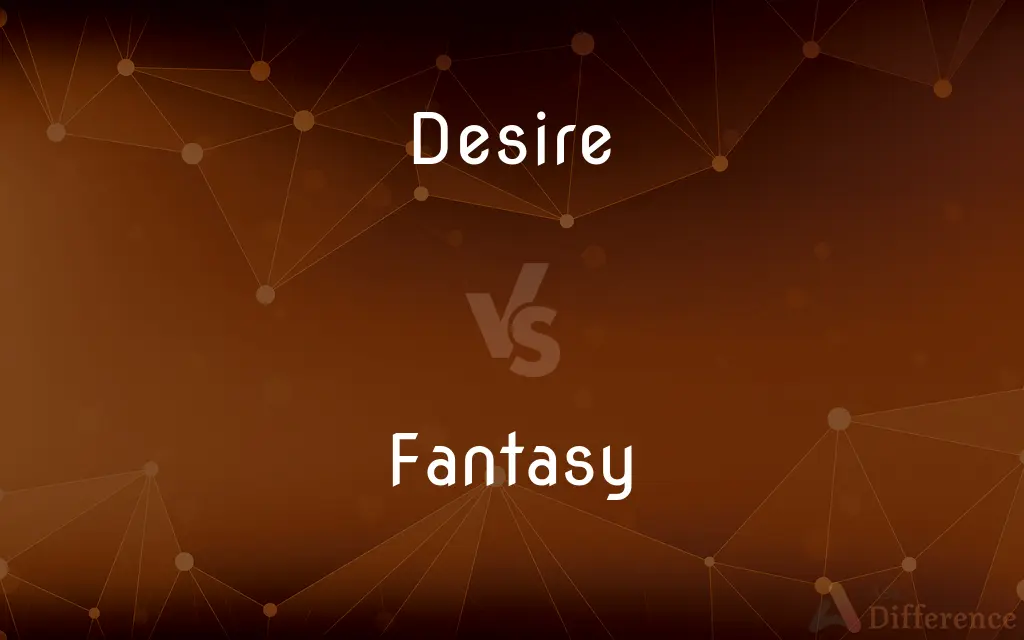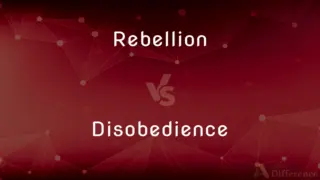Desire vs. Fantasy — What's the Difference?
By Maham Liaqat & Urooj Arif — Updated on April 9, 2024
Desire refers to strong feeling of wanting to have something or wishing for something to happen, grounded in reality or achievable goals. Fantasy, however, involves imagining things that are often unrealistic or improbable, serving as escape from reality.

Difference Between Desire and Fantasy
Table of Contents
ADVERTISEMENT
Key Differences
Desire is a fundamental emotion that drives individuals towards achieving specific goals, obtaining objects, or fulfilling needs. It is rooted in actual needs or wants, whether they be emotional, physical, or material. Desire can motivate actions and decisions, leading to real-world attempts to satisfy it. On the other hand, fantasy is a mental construct, a creation of the imagination that doesn't necessarily have a basis in reality. While fantasies can be influenced by desires, they often extend beyond practical or realistic expectations, offering an escape into a world of imagination.
Desire plays a crucial role in human motivation, influencing behavior by prompting individuals to strive for attainable outcomes. It is often linked to tangible goals, such as career aspirations, personal relationships, or possessions. Fantasy, however, serves a different psychological function, providing a space for creativity, exploration of the impossible, and sometimes a refuge from dissatisfaction with reality. Fantasies are not limited by the constraints of the real world, allowing for unlimited exploration of what could be, without the expectation of realization.
While desire can lead to concrete steps taken towards achieving a specific outcome, fantasy typically remains in the realm of thought. Desire can result in satisfaction or disappointment based on its fulfillment or lack thereof, impacting real-life emotions and states of mind. Fantasy, by its nature, does not usually directly result in such tangible outcomes, but it can influence one’s emotions, desires, and even inspire actions indirectly, by shaping one’s hopes, fears, and inspirations.
The relationship between desire and fantasy is complex and intertwined. Desires can give rise to fantasies, where individuals imagine the fulfillment of their desires in idealized scenarios. Conversely, fantasies can inspire desires by revealing previously unconsidered possibilities or aspirations. However, a key distinction lies in the actionability and the basis in reality: desires often push individuals to act, while fantasies might not lead to action but instead offer mental satisfaction or exploration.
Culturally and socially, desires and fantasies both play significant roles but are understood and manifested differently. Desires are often discussed in terms of goals, ambitions, and needs, seen as driving forces behind personal development and achievement. Fantasies are more associated with creativity, entertainment, and sometimes escapism, recognized for their value in enriching the human experience through imagination and innovation. Both are necessary for the psychological well-being of individuals, fulfilling different human needs for achievement and imagination.
ADVERTISEMENT
Comparison Chart
Definition
A strong feeling of wanting something achievable.
Imagining unrealistic or improbable scenarios.
Basis
Rooted in reality and achievable goals.
Not constrained by reality, often imaginative.
Role
Motivates actions towards a goal.
Provides escape and satisfaction through imagination.
Outcome
Can lead to real-world satisfaction or disappointment.
Primarily affects mental and emotional states.
Relation to Action
Often results in concrete steps towards fulfillment.
Typically remains within the realm of thought.
Compare with Definitions
Desire
Motivation to achieve a personal goal.
Her desire for success drove her to work hard.
Fantasy
A form of mental escapism.
Daydreaming about adventures in space is a favorite fantasy of his.
Desire
A longing for something that brings satisfaction or enjoyment.
She had a strong desire to travel the world.
Fantasy
A mental image of something desirable or ideal.
Living on a tropical island was her fantasy.
Desire
An aspiration or aim.
His desire to become a doctor was inspired by his volunteer work.
Fantasy
An imaginative creation or scenario.
His latest novel explores a fantasy world of dragons and magic.
Desire
A wish to possess something.
They shared a desire for a home in the countryside.
Fantasy
An unrealistic or improbable thought.
Winning the lottery remains a fantasy for many.
Desire
A physical or emotional need.
The desire for companionship is fundamental to human beings.
Fantasy
Creative fiction or storytelling.
Fantasy genres often include elements like mythical creatures and epic quests.
Desire
Desires are states of mind that are expressed by terms like "wanting", "wishing", "longing" or "craving". A great variety of features is commonly associated with desires.
Fantasy
Fantasy is a genre of speculative fiction set in a fictional universe, often inspired by real world myth and folklore. Its roots are in oral traditions, which then became fantasy literature and drama.
Desire
To wish or long for; want
A reporter who desires an interview.
A teen who desires to travel.
Fantasy
The faculty or activity of imagining impossible or improbable things
His researches had moved into the realms of fantasy
A fantasy world
Desire
To express a wish for; request.
Fantasy
A fantasia.
Desire
The feeling of wanting to have something or wishing that something will happen.
Fantasy
Imagine the occurrence of; fantasize about
It is ludicrous to fantasy ‘disinventing’ the hydrogen bomb
Desire
An instance of this feeling
She had a lifelong desire to visit China.
Fantasy
The creative imagination; unrestrained fancy.
Desire
An object of such feeling or passion
A quiet evening with you is my only desire.
Fantasy
Something, such as an invention, that is a creation of the fancy.
Desire
(Archaic) A request or petition.
Fantasy
A capricious or fantastic idea; a conceit.
Desire
To want; to wish for earnestly.
I desire to speak with you.
Fantasy
A genre of fiction or other artistic work characterized by fanciful or supernatural elements.
Desire
To put a request to (someone); to entreat.
Fantasy
A work of this genre.
Desire
To express a wish for; to entreat; to request.
Fantasy
An imagined event or sequence of mental images, such as a daydream, usually fulfilling a wish or psychological need.
Desire
To require; to demand; to claim.
Fantasy
An unrealistic or improbable supposition.
Desire
To miss; to regret.
Fantasy
(Music) See fantasia.
Desire
(countable) Someone or something wished for.
It is my desire to speak with you.
You’re my heart’s desire.
Fantasy
A coin issued especially by a questionable authority and not intended for use as currency.
Desire
(uncountable) The feeling of desiring; an eager longing for something.
Too much desire can seriously affect one’s judgment.
Fantasy
(Obsolete) A hallucination.
Desire
(uncountable) Motivation. en
Fantasy
Relating to or being a game in which participants act as owners of imaginary sports teams whose personnel consists of actual players selected from a professional sports league and team performance is determined by the combined statistics of the players.
Desire
To long for; to wish for earnestly; to covet.
Neither shall any man desire thy land.
Ye desire your child to live.
Fantasy
To imagine; visualize.
Desire
To express a wish for; to entreat; to request.
Then she said, Did I desire a son of my lord?
Desire him to go in; trouble him no more.
Fantasy
That which comes from one's imagination.
Desire
To require; to demand; to claim.
A doleful case desires a doleful song.
Fantasy
(literature) The literary genre generally dealing with themes of magic and the supernatural, imaginary worlds and creatures, etc.
Desire
To miss; to regret.
She shall be pleasant while she lives, and desired when she dies.
Fantasy
A fantastical design.
Desire
The natural longing that is excited by the enjoyment or the thought of any good, and impels to action or effort its continuance or possession; an eager wish to obtain or enjoy.
Unspeakable desire to see and know.
Fantasy
(slang) The drug gamma-hydroxybutyric acid.
Desire
An expressed wish; a request; petition.
And slowly was my mother broughtTo yield consent to my desire.
Fantasy
To fantasize (about).
Desire
Anything which is desired; an object of longing.
The Desire of all nations shall come.
Fantasy
(obsolete) To have a fancy for; to be pleased with; to like.
Desire
Excessive or morbid longing; lust; appetite.
Fantasy
(transitive) To imagine; to conceive mentally.
Desire
Grief; regret.
Fantasy
Fancy; imagination; especially, a whimsical or fanciful conception; a vagary of the imagination; whim; caprice; humor.
Is not this something more than fantasy ?
A thousand fantasiesBegin to throng into my memory.
Desire
The feeling that accompanies an unsatisfied state
Fantasy
Fantastic designs.
Embroidered with fantasies and flourishes of gold thread.
Desire
An inclination to want things;
A man of many desires
Fantasy
To have a fancy for; to be pleased with; to like; to fancy.
Which he doth most fantasy.
Desire
Something that is desired
Fantasy
Imagination unrestricted by reality;
A schoolgirl fantasy
Desire
Feel or have a desire for; want strongly;
I want to go home now
I want my own room
Fantasy
Fiction with a large amount of fantasy in it;
She made a lot of money writing romantic fantasies
Desire
Expect and wish;
I trust you will behave better from now on
I hope she understands that she cannot expect a raise
Fantasy
Something many people believe that is false;
They have the illusion that I am very wealthy
Desire
Express a desire for
Common Curiosities
How do desires affect behavior?
Desires motivate individuals to take actions towards achieving specific outcomes or fulfilling needs.
Is fantasy beneficial or harmful?
Fantasy can be beneficial as a form of escapism, creativity, and mental exploration, though excessive fantasy at the expense of action can be detrimental.
Can a fantasy become a desire?
Yes, a fantasy can inspire real desires if the individual starts to see aspects of their fantasy as achievable goals.
Are desires always realistic?
Desires tend to be based on attainable goals, though individuals’ assessment of what is achievable can vary, sometimes blending into fantasy.
What is the main difference between desire and fantasy?
Desire is a longing for something attainable, while fantasy involves imagining scenarios beyond the bounds of current reality.
Can desires lead to disappointment?
Yes, if desires are not fulfilled, they can lead to feelings of disappointment or dissatisfaction.
Do all people experience fantasy the same way?
No, the content and intensity of fantasies vary widely among individuals, influenced by personal experiences, desires, and creativity.
Why do people indulge in fantasies?
People indulge in fantasies for escapism, entertainment, and to explore desires and ideals without the constraints of reality.
Are there negative consequences to unfulfilled desires?
Unfulfilled desires can lead to feelings of frustration, dissatisfaction, and sometimes to reevaluation of goals or desires.
How can fantasies influence real-life decisions?
Fantasies can shape aspirations and inspire individuals to pursue new goals, indirectly influencing decision-making and actions.
How does society view desires and fantasies?
Society generally views desires as healthy motivations for personal development, while fantasies are seen as a valuable part of creativity and mental life, though excessive fantasizing without action can be viewed critically.
How do artists use fantasy?
Artists use fantasy to explore imaginative scenarios, express creativity, and comment on reality through the lens of the unreal, enriching cultural and artistic expression.
Can the fulfillment of a desire lead to happiness?
Fulfilling a desire can lead to temporary happiness and satisfaction, though long-term happiness is influenced by a broader set of factors.
How do desires and fantasies contribute to personal identity?
Desires and fantasies reflect individuals’ values, aspirations, and inner worlds, contributing to the development of personal identity and self-concept.
What role does culture play in shaping desires and fantasies?
Culture influences what individuals consider desirable or attainable, as well as the themes and content of fantasies, reflecting shared values and norms.
Share Your Discovery

Previous Comparison
Semiosis vs. Semiotics
Next Comparison
Rebellion vs. DisobedienceAuthor Spotlight
Written by
Maham LiaqatCo-written by
Urooj ArifUrooj is a skilled content writer at Ask Difference, known for her exceptional ability to simplify complex topics into engaging and informative content. With a passion for research and a flair for clear, concise writing, she consistently delivers articles that resonate with our diverse audience.











































